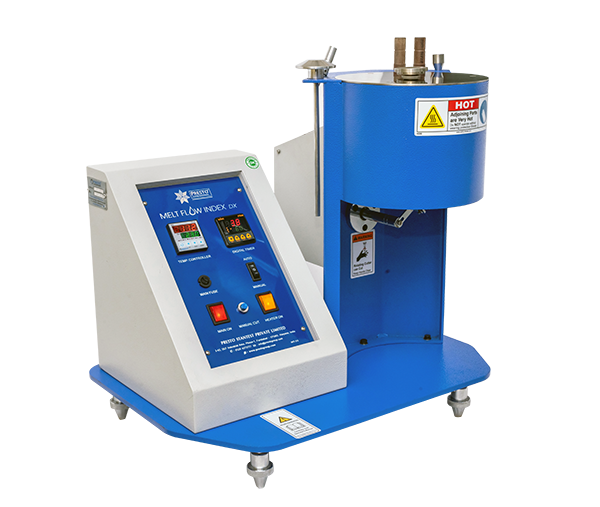
14-May-2025
Presto Instruments
In the plastic processing industry, understanding the intricate flow characteristics of polymers is essential for achieving both superior quality and efficient manufacturing. One of the most common parameters of flow behavior of the polymer is the Melt Flow Index (MFI).
It is a valuable tool for studying flow resistance and the molecular weight of thermoplastic materials. Measuring MFI precisely is crucial for ensuring product consistency and enhancing manufacturing processes. In this article, we discuss how to measure the melt flow index using an MFI tester.
Melt Flow Index (MFI), also known as Melt Flow Rate (MFR), is a crucial measure of the ease with which a molten polymer can flow. It evaluates the weight of the polymer that flows through a small, standardized die in a defined timeframe, under specified conditions of temperature and pressure.
This value, typically measured in grams per 10 minutes (g/10 min), reflects a polymer's processing behavior and is important for assessing its performance in various manufacturing methods. MFI is a crucial parameter in material specifications, assisting manufacturers in determining its suitability for injection molding, extrusion, or blow molding.
A Melt Flow Index (MFI) Tester is an instrument that determines the ease with which a melted polymer can flow through a small orifice under defined temperature and pressure conditions. It is important in plastics production as it gives information about a material's processability, quality, and applicability to different uses.
This is critical to industries like plastics, automobile, packaging, and medical devices to ensure the raw materials meet the quality parameters required.
Testing by MFI confirms that the plastic material conforms to industrial standards and is of uniform quality, critical to producing dependable products.
MFI value aids in determining the ease with which a polymer can be processed by various manufacturing processes, such as injection molding or extrusion, ensuring production efficiency.
Testing by MFI assists manufacturers in selecting the proper type of plastic for intended use, with optimum performance, minimizing waste.
MFI can also be employed to compare materials from various suppliers and enable manufacturers to make good purchasing decisions.
MFI is an important aid to product development, enabling manufacturers to test the quality and performance of new materials.
The MFI value can be applied to foretell the behavior of a polymer when subjected to varying processing conditions, facilitating process optimization and troubleshooting.
Testing of MFI ensures the uniformity of material properties within the course of production, resulting in more dependable final products.

A melt flow index tester is usually employed to determine the Melt Flow Index (MFI). The MFI test measures the mass of a polymer that flows through a die within a specified time under controlled conditions, typically at a set temperature and load.
To precisely measure the MFI with an MFI tester, use the following standardized procedure:
MFI = Total mass of product (g)/Total time (min)*10
MFI Tester is also critical to the plastic business, enabling manufacturers and scientists to measure the ease with which a polymer flows and melts under heat and pressure.
Here are some major applications explained for the MFI tester:
In plastic manufacturing plants, there is a need to maintain consistent product quality. The MFI tester is employed to test each batch of raw material to guarantee that it meets the specified requirements. Differences in MFI may reflect differences in polymer chain length, contamination, or degradation. Detecting early on through MFI testing prevents defective products and downtime in production.
Engineers and product designers utilize MFI values to select the appropriate polymer grade for given manufacturing processes such as injection molding, blow molding, or extrusion. For instance, a polymer with low MFI (high viscosity) is suitable for structural parts, whereas high MFI is suitable for complex mold designs that demand improved flow.
As sustainability becomes increasingly stressed, recycled plastics are increasingly used. Recycled polymers, though, are not always of the same quality. MFI testing makes it possible for recyclers to measure consistency and usability in batches of recycled plastic. By referencing the MFI of recycled material to virgin resins, manufacturers can process or mix them as necessary.
In R&D laboratories, MFI testers are employed to investigate the behavior of new formulations of polymers or additives. Scientists can test how molecular structure changes, plasticizers, or fillers influence melt flow. This information aids in the development of improved performance and cost-efficient materials.
Various international standards, including ASTM D1238 and ISO 1133, necessitate material certification through MFI testing. Suppliers of raw polymers or final plastic products are required to supply MFI information to satisfy compliance with these standards, particularly for export to international markets.
Knowing how to test Melt Flow Index with an MFI tester is crucial for anybody doing plastic processing or quality control. This easy but effective test gives a fast appraisal of the flow characteristics of a polymer, allowing superior material choice and superior process control. With proper methodology and equipment, manufacturers can achieve uniform product quality and optimize their manufacturing efficiency.
Presto Instruments is a leading melt flow index tester manufacturer in uae, committed to global quality standards. Our equipment is designed to improve product reliability, reduce defects, and ensure consistent performance. Trusted by industries worldwide, we offer reliable and customized solutions to meet your testing needs. Contact us today.
Elevate your quality assurance process to new heights
At Presto, we take pride in being Global manufacturers of Laboratory Testing Instruments for different industries.